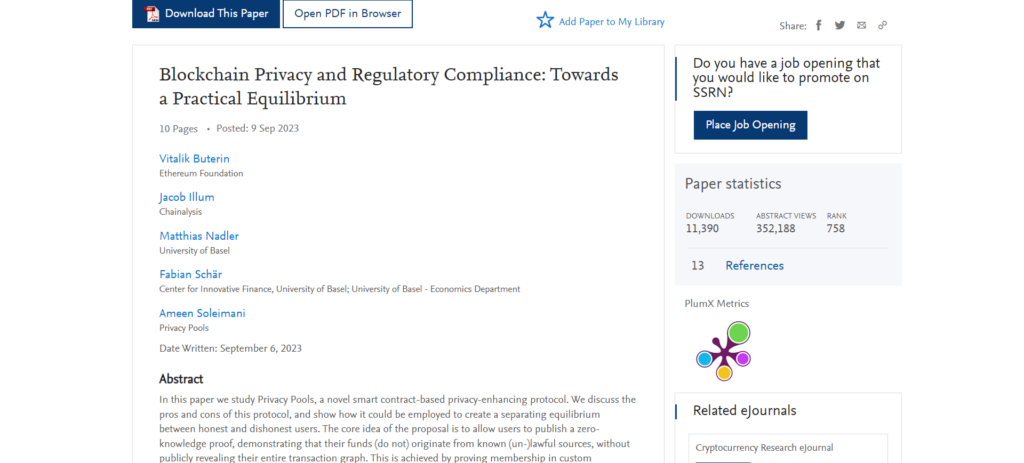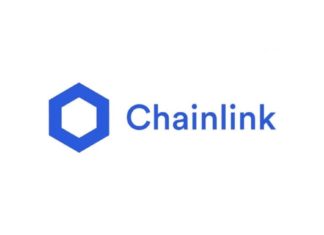Privacy in crypto is a hot topic. Blockchains are transparent and at the same time pseudonymous. In other words, transactions are publicly available. However, you can’t easily connect a wallet to an identity. On the other hand, privacy should be a given right for each person. Now, in the crypto space, that may clash with regulation.
Vitalik Buterin recently published an interesting paper on this topic. He tries to find a balance between privacy on one side and regulatory compliance on the other side. He suggested privacy pools for this. That’s where the Data Ownership Protocol or DOP offers a solution. So, let’s dive a bit deeper into what DOP came up with.
Our newest article explores how DOP delivers on @VitalikButerin‘s vision for balancing privacy and compliance on blockchains.
Read why DOP’s selective transparency aligns well with Buterin’s proposals for association sets and balancing over-transparency: https://t.co/7a8Wz1PlSt pic.twitter.com/Dh3YynfkTY— Data Ownership Protocol (@dop_org) October 19, 2023
What are Vitalik Buterin’s Privacy Pools?
Vitalik Buterin recently proposed a privacy solution. For this, he sees privacy pools as a solution. It allows people to prove that their crypto comes from lawful sources. They can do so without showing their complete transaction history. This also accommodates law enforcement agencies. That’s because it separates and isolates any lawbreaking ventures.
That’s where DOP offers a similar solution. You can select what part of your crypto holdings you show and to whom. Other noncustodial solutions couldn’t make that distinction. For example, Tornado Cash. As a result, this is now sanctioned by the US.
DOP allows you to hide your holdings from public view. Plus, any other balances in your wallet. Currently, it’s only available on Ethereum. However, more EVM-compatible chains will follow.
But, back to Buterin and the privacy pools he proposed. These pools allow you to prove that your crypto is ‘clean’. There are no middlemen involved with these pools, thus, excluding centralized mediators. These pools should have two components, “membership proofs” and “exclusion proofs”. This allows you to confirm the origin of your funds and nothing more.
Association Sets
He also mentions ‘association sets’. These involve zero-knowledge technology. It allows honest crypto users to set themselves apart from bad actors. For example, in a group of five persons, one is a bad actor. We don’t know their names, remember, blockchains are pseudonymous. However, the bad actor’s address has received unlawful funds. It’s linked to a DeFi exploit.
This allows the four innocent people to exclude the bad actor in their group. As a result, by showing their addresses, it’s likely that their addresses remain whitelisted. On the other hand, the bad actor in the group is now isolated. This wallet sticks now out like a sore thumb. Below is a picture of Buterin’s research paper.
Source: Buterin’s research paper on privacy
The DOP Solution
DOP approached the privacy issues described by Buterin with their protocol. For example, there will be a DAO or a decentralized autonomous organization to run things. Any DOP user can flag conspicuous activities. The DAO will investigate this and if needed, take action. This isolates any bad actors. On the other hand, law-abiding investors can continue their daily routines. The DAO eliminates any centralized points of failure.
The way Buterin sees the associations is by users subscribing to “association set providers” (ASPs). These pick associations for you. He also mentions a monthly fee. Verification would be with a soulbound token. This prevents ill-natured association sets from infiltrating. New deposits could also see a week-long lag. Thus, preventing funds from exploits mingling with clean crypto funds.
DOP offers a solution to this. You can block out your data and only share them with selected entities or people. Only share the data that you’re comfortable with. Furthermore, you control who can access your data and how much of it. So, nobody knows how much crypto your wallets hold, where it came from, or where it goes. Except for those that you allow to know this information.
Of course, there are challenges. For example, compare this with specific laws in various countries. Take alcohol as an example. Some countries allow this. Whilst other countries ban alcohol, or have severe restrictions on possessing it. Buterin envisions localized privacy pools. They make sure you stay within local laws.
DOP also offers a solution to accommodate these challenges. For this, DOP uses zk technology, like zk-SNARKS. Thus, keeping your wallet legit and whitelisted. The protocol is also entirely compatible with third-party wallets. That’s because DOP offers selective transparency. Importantly, YOU select.
(1/4) We’re excited to release a demo of Phase 1 of the DOP protocol on Ethereum! This video shows initial capabilities like encrypted transfers – the core technology on the road to data ownership and selective transparency. pic.twitter.com/hZBiH5Gwoo
— Data Ownership Protocol (@dop_org) October 12, 2023
Conclusion
Vitalik Buterin recently co-authored a research paper on privacy and regulatory compliance. DOP addresses all the issues raised in this interesting paper. DOP lets you control how much information in your crypto wallet’s content you share and with whom. Their solution offers you selective transparency. Currently, only on Ethereum, but more EVM chains will follow.
Disclaimer
The information discussed by Altcoin Buzz is not financial advice. This is for educational, entertainment and informational purposes only. Any information or strategies are thoughts and opinions relevant to accepted levels of risk tolerance of the writer/reviewers, and their risk tolerance may be different from yours.
We are not responsible for any losses that you may incur as a result of any investments directly or indirectly related to the information provided. Bitcoin and other cryptocurrencies are high-risk investments, so please do your due diligence. This article has been sponsored by DOP.
Copyright Altcoin Buzz Pte Ltd.






























